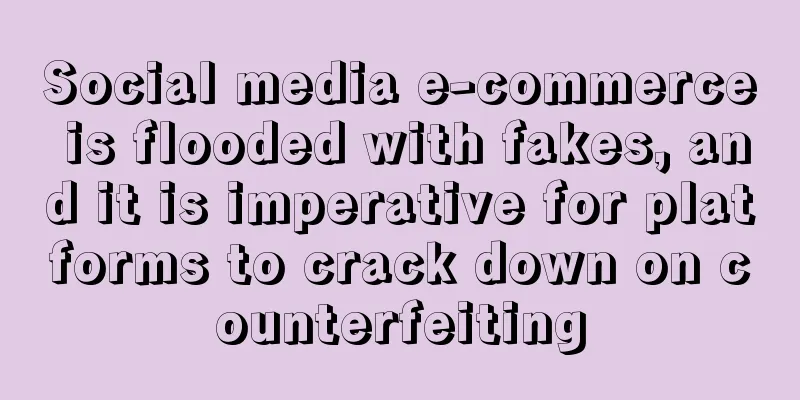Social media e-commerce is flooded with fakes, and it is imperative for platforms to crack down on counterfeiting

|
The UK Intellectual Property Office (UKIPO) recently surveyed 1,000 female consumers to measure the situation of counterfeit products in the social media e-commerce market and determine the influence of influencers on social media platforms in promoting the sale of counterfeit products .
The UKIPO found in its survey that 17% of respondents ( 70% aged between 16 and 33) had purchased counterfeit products in the past year , and 13.3% of respondents said that they were influenced by bloggers on social media platforms to buy counterfeit products .
In other words, 13.3% of respondents deliberately purchased counterfeit products at the behest of social media influencers. The UKIPO believes that influencers are a noteworthy force in promoting counterfeit products and an important channel for counterfeit suppliers to enter the market.
According to a previous report by the UKIPO , fashion clothing and accessories are an important market where counterfeits are rampant . Such products are particularly attractive to young consumers, with 20% of respondents saying they had purchased pirated clothing or accessories in the past year , compared to 4% for older consumers .
The UKIPO report also mentioned that in addition to the two categories of fashion clothing and accessories , the jewelry , watches and beauty products markets are also flooded with pirated products .
Interesting findings from the UKIPO survey are that 18% of respondents believe that counterfeit products do not harm businesses and jobs, 22% believe that counterfeit products do not pose a threat to their health and safety, and 33% say that the prevalence of counterfeits is due to brands pricing their products too high.
In fact, there is already a lot of content involving counterfeit goods on Google , YouTube , and social media sites such as Instagram and TikTok . Browsing YouTube, you will find that many videos posted by content creators dominated by young women promote counterfeit clothing, accessories and beauty products to subscribers .
Where there is counterfeiting, there must be anti-counterfeiting. Brands and market platforms are joining forces to crack down on the sale of counterfeit goods by influencers.
Amazon sued social media influencers Kelly Fitzpatrick and Sabrina Kelly in November 2020 Krejci conspired with sellers on the Amazon marketplace to promote counterfeit luxury goods on the Instagram platform .
Facebook also cooperated with Gucci in April 2021 to file a lawsuit against an influencer named Natalia Kokhtenko . The influencer used the Facebook and Instagram platforms to sell counterfeit luxury brand goods, violating trademark law and the terms and policies of the Facebook and Instagram platforms .
In general, platform anti-counterfeiting is an important means to protect property rights and maintain market order. However, anti-counterfeiting is also a long process. To create a healthy market environment, it still requires the joint efforts of the platform, platform merchants and consumers. Social e-commerce policy operations Amazon Platform |
<<: Cross-border transactions will reach $156 trillion in 2022! Free shipping is awesome...
>>: Domestic children's trucks recalled due to lead poisoning risk
Recommend
What is Zoho Commerce? Zoho Commerce Review, Features
Zoho Commerce is a website building tool that was ...
The mining craze has caused hard disk prices to rise and stocks to run out, and enterprise-level hard disks have become the main target of purchase
Recently, the hard drive mining situation has bee...
Amazon's top five best-selling product categories in the first quarter of 2022
In contrast to the holiday season, e-commerce sal...
Amazon decides to postpone new FBA delivery process
Amazon previously asked sellers to prepare to swi...
What is Drucker Technology? Drucker Technology Review, Features
Drucker Technology (Shenzhen Drucker Technology C...
What is Saudi Arabian Capital Market Authority? Saudi Arabian Capital Market Authority Review, Features
The Capital Market Authority of Saudi Arabia is a...
The seller deleted the negative reviews in defiance of the law! He was reported by the buyer and his account was blocked
Despite Amazon's severe crackdown, some selle...
Beihang students' account was blocked by Amazon due to delivery address, customer service: comply with sanctions regulations
A student from Beijing University of Aeronautics ...
What is Tata CLiQ? Tata CLiQ Review, Features
Tata CLiQ is an e-commerce platform under the Indi...
What is Meesho? Meesho Review, Features
Meesho is an Indian social media e-commerce platfo...
What is Bicoo Technology? Bicoo Technology Review, Features
Founded on October 11, 2016, Bigoo Technology (Xi...
Staples is using a new e-commerce platform to promote its products
With a multi-channel online sales strategy, Stapl...
What is Pitney Bowes? Pitney Bowes Review, Features
Pitney Bowes is a global technology company provid...
What is Falabella? Falabella Review, Features
Falabella is a Chilean online shopping website tha...
What is sugarcosmetics? sugarcosmetics Review, Features
sugarcosmetics is an Indian beauty brand. About su...









